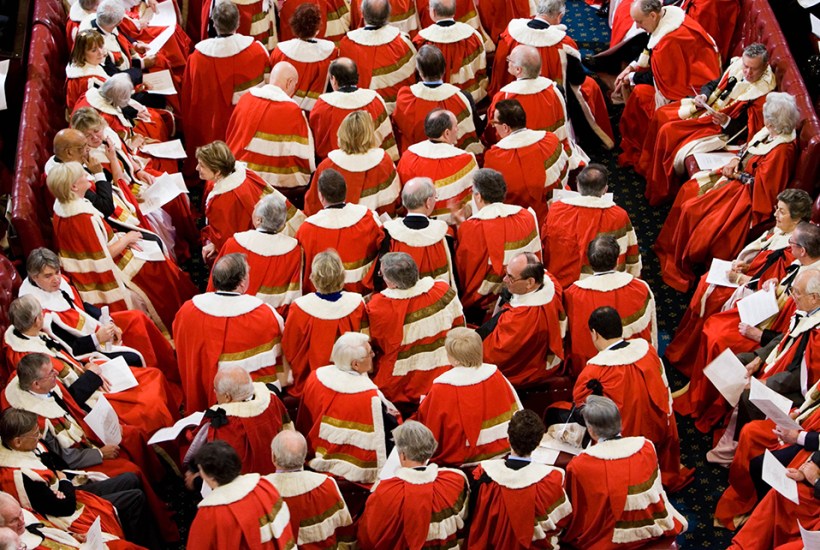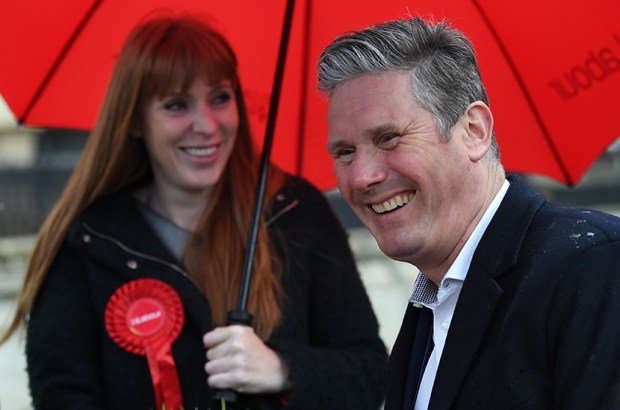It’s not just the government that’s now beholden to forecasts from the Office for Budget Responsibility. Keir Starmer told the BBC that Labour doesn’t ‘quarrel with the number that the OBR put out as a target or trying to get the debt down’. So Starmer accepts that the government needs to find around £50 billion through spending cuts or tax rises to get debt falling as a percentage of GDP in the medium term. This applies not only to the current government, but to any government he may run in the future.
Of course, Labour stress that they would make ‘different choices’ to the Tories in how they close a fiscal gap of more than £50 billion. But they are not denying that it exists or proposing that another government could simply borrow more to fund more day-to-day spending. Starmer is not going to allow Rishi Sunak or Jeremy Hunt to accuse his party of heading for a repeat of Liz Truss’s mistakes: borrowing too much and risking a spike in interest rates.
Labour may well make ‘different choices’ but there is no simple – or appealing – solution. Taxing the rich more won’t be enough. Labour’s plan to change the rules on non-domiciled taxation would raise only £3 billion. Furthermore, Labour has already committed that money to training more doctors. If Labour want to spend substantially more than the Tories, they will have to tax the middle class even more.
It is important to note that there are more OBR forecasts on the way and the current one will almost certainly be wrong – though, worryingly, the OBR is considerably more optimistic than the Bank of England, which predicts eight consecutive quarters of negative growth, compared to the OBR’s five. If the Bank’s forecast turns out to be more accurate, the gap that the parties will need to close will be even bigger. But whatever the final numbers are, both Sunak and Starmer are going to have to go into the 2024 election with tightened belts. In the Treasury, the expectation is that both parties will end up promising only the mildest of increases in public spending; something that will indicate real-terms cuts for most departments, given how much of that increase will end up going to the NHS.
It is telling that since the Autumn Statement, Labour have attacked the Tories for the dire overall state of the public finances, rather than the individual measures announced by Hunt. Starmer and Rachel Reeves have also stressed that the finances are such that they won’t be able to do everything they want in one term. This is both an appeal for patience from their supporters and an attempt to set out their argument for a second term early on, as Tony Blair did in 1997.
The unappealing fiscal choices in front of the opposition leader perhaps explain why House of Lords reform has reappeared on the Labour agenda. The Observer reported on Sunday that Starmer had told Labour peers that he wanted to end the right of politicians to appoint peers and to move to an elected upper house.
The advantage of this policy is that it is free. There’s no meaningful fiscal cost to constitutional reform. It also punches a Tory bruise, as there’s currently controversy over Boris Johnson’s resignation honours, which reportedly include peerages for various sitting MPs. The last thing the Tories need right now is a bunch of by-elections, so it is expected that these MPs will defer their peerages until after the next election. But there is no constitutional precedent for a group of people doing this. The list is also attracting controversy because it supposedly contains several youthful aides to the former prime minister who don’t have the experience peers normally do.
These peerages – following the controversial ennoblement of Lord Lebedev of Hampton in the London Borough of Richmond upon Thames and of Siberia in the Russian Federation (to give him his full title) – means that the status quo is hard to defend at the moment. It won’t get any easier if Truss’s resignation honours bring further controversial additions to the upper house.
No votes are lost by talking about Lords reform in these circumstances. Starmer can emphasise that he represents a fresh start by proposing the clear-out. He also knows that constitutional reform is one of the ways that governments shape the landscape decades after they have left office: New Labour’s devolution settlement and the human rights act are still changing the country long after Blair and Brown packed their bags. A final advantage to the policy is that it is progressive-alliance friendly. If the Tories do stage a revival and Labour needs the acquiescence of the Liberal Democrats to govern, then constitutional reform will have to be part of the package.
The disadvantage, however, is that it will swallow time and almost certainly not play out as Starmer intends. In 1997, Blair promised to get rid of hereditary peers: 25 years on, there are still a small clump of them in the second chamber with their numbers maintained by regular by-elections. In 2010, the coalition committed itself to a chamber that was wholly or mainly elected under a proportional voting system. But a Tory backbench rebellion killed off the idea. Even if the bill had made it out of the Commons, it would have a hard time in the House of Lords itself. Indeed, a government that really wanted to reform the Lords wholesale would have to accept that its whole legislative agenda could be held up by this fight.
Starmer’s desire to stop politicians appointing whoever they like to the Lords sounds virtuous, but there are some practical drawbacks. The Lords is the quickest way to bring outside expertise into the ministerial ranks. This function is not used enough, but it can improve government if done correctly.
For now, though, Lords reform benefits Starmer. It makes him sound radical without costing money. In present circumstances, that’s a high-value policy.
The post Why Starmer’s going after the Lords appeared first on The Spectator.
Got something to add? Join the discussion and comment below.
Get 10 issues for just $10
Subscribe to The Spectator Australia today for the next 10 magazine issues, plus full online access, for just $10.
You might disagree with half of it, but you’ll enjoy reading all of it. Try your first month for free, then just $2 a week for the remainder of your first year.















Comments
Don't miss out
Join the conversation with other Spectator Australia readers. Subscribe to leave a comment.
SUBSCRIBEAlready a subscriber? Log in